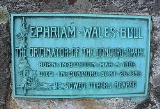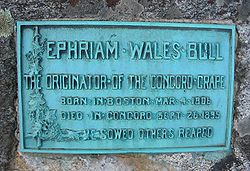
Ephraim Wales Bull
Encyclopedia
Ephraim Wales Bull was the creator of the Concord grape.
. Complaining of lung problems, he moved away from the city. He moved to Concord
in 1836, settling with his wife on a farm next door to Amos Bronson Alcott
.
 In 1843, Bull began the deliberate process of breeding a grape that could thrive in the cold New England
In 1843, Bull began the deliberate process of breeding a grape that could thrive in the cold New England
climate. By 1849, having planted 22,000 seedlings, he had created a large, sweet variety from a native species. By 1853, the grapes were for sale, but within several years, competing growers had begun raising their own crops of Concord grapes, purchased from Bull for $5 per vine. Bull saw little profit from the strain after the initial sales.
Ephraim Bull was elected to the Massachusetts
House of Representatives
in 1855. In 1893, after a fall, he ended up in the Concord Home for the Aged. He died in 1895. His epitaph
reads, He Sowed Others Reaped.
Biography
Born in Boston, Massachusetts, Bull was apprenticed to a gold-beater at a young age. On September 10, 1826, he married Mary Ellen Walker of Dorchester, MassachusettsDorchester, Massachusetts
Dorchester is a dissolved municipality and current neighborhood of Boston, Massachusetts, United States. It is named after the town of Dorchester in the English county of Dorset, from which Puritans emigrated and is today endearingly nicknamed "Dot" by its residents. Dorchester, including a large...
. Complaining of lung problems, he moved away from the city. He moved to Concord
Concord, Massachusetts
Concord is a town in Middlesex County, Massachusetts, in the United States. As of the 2010 census, the town population was 17,668. Although a small town, Concord is noted for its leading roles in American history and literature.-History:...
in 1836, settling with his wife on a farm next door to Amos Bronson Alcott
Amos Bronson Alcott
Amos Bronson Alcott was an American teacher, writer, philosopher, and reformer. As an educator, Alcott pioneered new ways of interacting with young students, focusing on a conversational style, and avoided traditional punishment. He hoped to perfect the human spirit and, to that end, advocated a...
.

New England
New England is a region in the northeastern corner of the United States consisting of the six states of Maine, New Hampshire, Vermont, Massachusetts, Rhode Island, and Connecticut...
climate. By 1849, having planted 22,000 seedlings, he had created a large, sweet variety from a native species. By 1853, the grapes were for sale, but within several years, competing growers had begun raising their own crops of Concord grapes, purchased from Bull for $5 per vine. Bull saw little profit from the strain after the initial sales.
Ephraim Bull was elected to the Massachusetts
Massachusetts
The Commonwealth of Massachusetts is a state in the New England region of the northeastern United States of America. It is bordered by Rhode Island and Connecticut to the south, New York to the west, and Vermont and New Hampshire to the north; at its east lies the Atlantic Ocean. As of the 2010...
House of Representatives
Massachusetts House of Representatives
The Massachusetts House of Representatives is the lower house of the Massachusetts General Court, the state legislature of the Commonwealth of Massachusetts. It is composed of 160 members elected from single-member electoral districts across the Commonwealth. Representatives serve two-year terms...
in 1855. In 1893, after a fall, he ended up in the Concord Home for the Aged. He died in 1895. His epitaph
Epitaph
An epitaph is a short text honoring a deceased person, strictly speaking that is inscribed on their tombstone or plaque, but also used figuratively. Some are specified by the dead person beforehand, others chosen by those responsible for the burial...
reads, He Sowed Others Reaped.
External links
- Collins, Paul. Banvard's Folly: Thirteen Tales of People Who Didn't Change The World. Picador USA, 2001.
- Ancient Middlesex with Brief Biographical Sketches Ephraim Wales Bull article on page 37.

